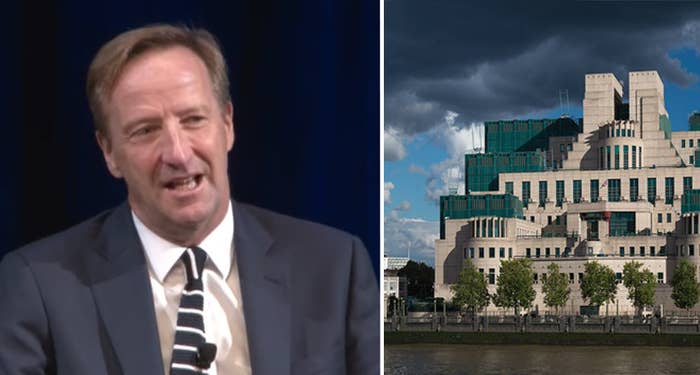
The chief of MI6 has said he is deeply concerned by the threat posed by rival countries attempting to undermine democracy through propaganda and cyberattacks.
Alex Younger, aka “C”, used a rare public speech to say he was deeply concerned about the risks posed by hybrid warfare, where countries take advantage of the internet to “further their aims deniably” through “means as varied as cyberattacks, propaganda, or subversion of democratic process”.
Although he did not name Russia directly, the comments come following accusations that the Kremlin has attempted to influence elections in the US and Europe using underhand tactics ranging from undeclared direct funding, to hacking emails, to spreading fake news.
“Our job is to give the government the information advantage; to shine a light on these activities and to help our country and allies, in particular across Europe, build the resilience they need to protect themselves," Younger said. "The risks at stake are profound and represent a fundamental threat to our sovereignty; they should be a concern to all those who share democratic values.”
He said MI6 was undertaking “complex and risky” work to undermine such efforts. “Our success in this mission will depend on our ability to win trust, harness modern technology, and to work in partnership,” he said.
It was the first time Younger, who has led the Secret Intelligence Service since 2014, has given an on-the-record public speech to journalists inside the iconic MI6 headquarters on the banks of the Thames in Vauxhall, central London.
Although the speech was billed as showing the agency’s new openness, access remained limited. A small group of journalists, including BuzzFeed News, were taken into the tightly controlled building and guided straight into an anonymous wood-panelled modern conference room with leather seats for around 30 people.
The only glimpse inside the iconic building was an anonymous lobby featuring a portrait of the Queen, signs warning of a heightened response level, and a modestly decorated Christmas tree with a handful of presents underneath.
There was also a plaque paying tribute to all the MI6 officers and agents “who gave their lives in defence of this country and of freedom”.
In a further sign of the event's careful stage management, although broadcasters will show clips of the speech, the version provided to television stations was pre-recorded for technical reasons.
Many of the MI6 chief's concerns revolved around Russia, particularly the country’s involvement in Syria and the long-term terror threat posed by the region.
“I believe the Russian conduct in Syria, allied with that of Assad’s discredited regime, will, if they do not change course, provide a tragic example of the perils of forfeiting legitimacy," he said. "In defining as a terrorist anyone who opposes a brutal government, they alienate precisely that group that has to be on side if the extremists are to be defeated. Meanwhile, in Aleppo, Russia and the Syrian regime seek to make a desert and call it peace. The human tragedy is heartbreaking.
“We cannot be safe from the threats that emanate from that land unless the civil war is brought to an end.”
Younger also appeared to suggest that fears the Brexit vote or Donald Trump’s victory in the US presidential election would undermine Britain’s ability to share intelligence with allies were overblown: “I will aim for, and expect, continuity. These relationships are long-lasting and the personal bonds between us are strong. The threats that we faced before these events have not gone away. The joint capabilities we had before exist now. Indeed, they are getting stronger.”
Although he did not give specific details about how the agency undermines the “murderously efficient” ISIS, he claimed MI6 and GCHQ have “on numerous occasions given MI5 and the police the information they need to identity and stop threats in the UK and to our allies”, and said a dozen UK terror plots had been stopped since June 2013.
He also said he wanted to hire more specialist staff from nontraditional backgrounds to help with the agency’s work: “While the essence of what we do – creating relationships of trust – will remain unchanged, in this century as it has in the last, the environment in which we do it has altered out of all recognition. In short, data and the internet have turned our business on its head. They represent an existential threat combined with a golden opportunity.”
As a result he strongly defended the controversial Investigatory Powers Act, dubbed the snoopers’ charter by critics, praising its “checks and balances”, which involve ministers and the judiciary, and insisting he was pleased by the “quality of debate” around the act.
He warned against the dangers of intelligence agency groupthink, as highlighted by the Chilcot report into the Iraq war, and insisted: “MI6 is accountable and so is every officer who works here.”
Younger, who joined MI6 in 1991, said he felt James Bond films had contributed to a “frequently misleading” view of MI6.
“Were Mr Bond to apply to join MI6 now," he said, "he would have to change his ways.”
